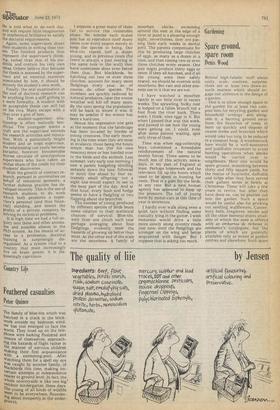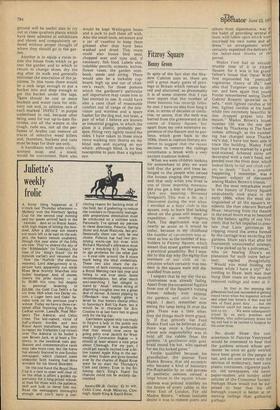Gardening
Spare ground, spare room
Denis Wood
Behind high-falutin' stuff about unity, scale, contrast, surprise, there are at least two down-toearth matters which should engage our attention in the design of a garden.
One is to allow enough space in the garden for at least two compost bins for recycling garden and household ' arisings ' and, alongside it, a burning ground away from the branches of trees, to burn up quickly and dispose of coarse stems and branches which would take too long to be reduced in a compost heap. A weathercock here would be a well-mannered and justifiable ornament to avoid burning operations when smoke would be carried over to neighbours. Here also would be spare ground, something between thirty and fifty square yards, for the rescue of hyacinths, daffodils and tulips after they have served their gallant terms in bowls at Christmas. These will take a few years to revive, but after they have done so, can be planted out into the garden. Such a space would be useful also for pricking out seedling wallflowers, Canterbury bells, foxgloves, stocks and all the other biennial plants available of which the seed is offered with an embarras de richesse in seedsmen's catalogues, but the plants of which are generally available only as mixed at garden centres and elsewhere. Such spare ground will be useful also to try out at close quarters plants which have been admired at exhibitions and shows and compulsively ordered without proper thought of where they should go in the garden.
Another is to equip a room inside the house from which to go into the garden and to which to return to change shoes, dry the dog after its walk and generally minimise the execration of the janitress. In this room there would be a sink large enough to put a bucket into and deep enough to get the bucket under the taps. There should be one or more buckets and water cans for ordinary use and, in addition, one of each marked INFECT ' in purple underlined in red, because after being used for our up-to-date floricides, not all the waters in the rough, rude sea, nor all the perfumes of Arabia can remove all traces of selective weed killers and, therefore, buckets and cans must be kept for their use only.
A handbasin with some civillyscented soap, and a towel, would be convenient. Here also would be kept Wellington boots and a jack to pull them off with. Also the small tools, secateurs and a jar of vaseline to keep them greased after they have been washed and dried. This room could also house bird seed, chopped suet and nuts and, if necessary, fish food. Labels also, indelible pencils, scissors, knives, flower vases, the garden notebook, seeds and string. There would also be a lockable cupboard, high up and out of children's reach, for those poisons which the gardener's particular self importance may cause him to feel entitled to use. It could have also a cane chair of reasonable comfort out of range of the television and wireless and a spare basket for the dog and, not least, a pair of what I believe are known as industrial goggles, in which the glass is a plastic, probably perspex, fitting very tightly round the sides. I have taken to these since twice walking into thorns on my blind side and injuring an eye which, although blind, is no less susceptible to pain than a sighted eye.



































 Previous page
Previous page